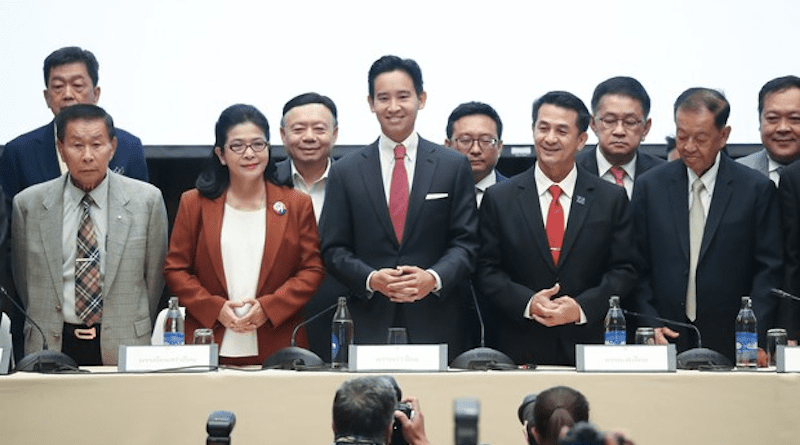Thailand: Alliance Agrees On Reform Agenda But No Mention Of Royal Insult Law
By BenarNews
By Wilawan Watcharasakwej
An eight-party alliance seeking to form Thailand’s next government signed an agreement Monday outlining an ambitious reform agenda, though a commitment to amend the nation’s royal insult law was conspicuously absent.
The alliance, led by the top vote-getting party in this month’s election, Move Forward, announced plans to rewrite the constitution, end business monopolies and modernize the justice system and security forces, according to the agreement with the coalition parties seen by BenarNews.
The agreement coincided with the ninth anniversary of the May 22, 2014, military coup led by now-Prime Minister Prayuth Chan-o-cha – his and other royalist and military-backed conservative parties were trounced in the May 14 vote.
However, Move Forward leader Pita Limjaroenrat said the reforms would not alter the status of the monarchy – Article 6 of the military-backed constitution stipulates that no legal proceedings can touch the monarch.
“All parties agree that every mission that the government undertakes must not affect the country’s status as a unitary state, the country’s status as a democracy under a constitutional monarchy framework and the inviolable status of the monarch,” the alliance’s agreement said.
“I reaffirm Article 112 [Lèse-Majesté, or royal defamation] will be one of 45 bills the Move Forward will push through the parliament for a mature discussion. …When a chance to discuss it is found, it’s a good opportunity,” Pita told reporters on Monday.
The coalition’s agreement promised to “restore democracy and rewrite a new people’s constitution, by a committee elected by the people, as soon as possible.”
It also vowed to make the police, military and judiciary more democratically accountable and transparent; called for an end to military conscription; and sought to push for lasting peace in the Deep South, including a review of the security mission in the restive region.
The eight parties are seeking to decentralize power to local authorities, refine the country’s hastily drawn up cannabis laws, and “restore the leading role of Thailand in ASEAN.”
The eight-party alliance holds 313 of the 500 seats in Parliament’s lower house, but is short of the combined number of 376 votes required from both houses to govern.
Rules enshrined in the military-drafted constitution mean the alliance has to overcome 250 votes held by the junta-appointed Senate, Parliament’s upper house.
The Parliament is expected to convene within 15 days after the election results are officially announced. The Election Commission of Thailand is required to announce the results within 60 days after the May 14 election.
Contentious issue
Pita was asked if his insistence on reforming the royal insult law could prompt senators to vote against him during the election of the prime minister candidate.
“I don’t think so because Move Forward has negotiation teams to ease the Senate’s concerns, citing the law’s intent and the substance that it [Article 112] should not be used to politically harass others,” he said.
Move Forward’s ambition to amend the Lèse-Majesté law, which human rights groups allege the current government has used to silence dissent, is shaping up to be one of its biggest hurdles to forming a government.
The law carries jail terms of up to 15 years for actions or speech deemed as insulting, defamatory or threatening to the monarchy.
However, Move Forward’s pledge to reform Thailand’s relationship with the monarchy is contentious, even within its alliance.
“We won’t put any obstructor in the MoU [memorandum of understanding],” Cholnan Srikaew, a leader of Pheu Thai Party, an alliance member that won the second-highest number of votes, told the news conference.
“So for the amendment of Article 112, the Pheu Thai Party needs to see the [yet undrafted] draft amendment proposal first and we will consider this again. … To support the amendment of this law or not, it is the right of each individual MP.”
Another coalition member, Thai Sang Thai Party, which is strongly against amending Lèse-Majesté, which has been used to suppress pro-democracy protesters since November 2020.
“We insist on not supporting any amendment or withdrawing Article 112,” Sudarat Keyuraphan, the leader of Thai Sang Thai Party, said at the same news conference.

